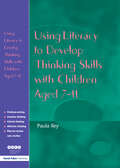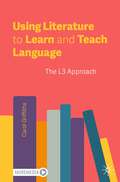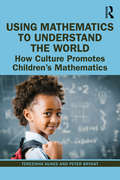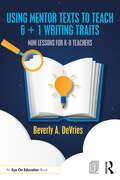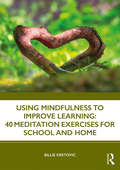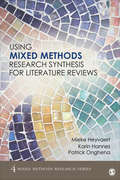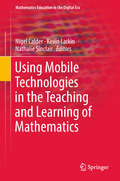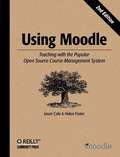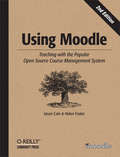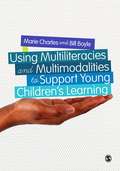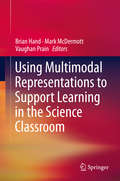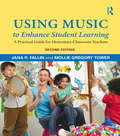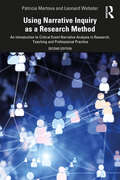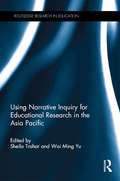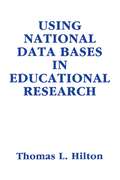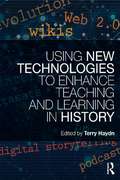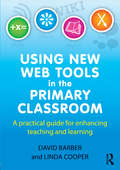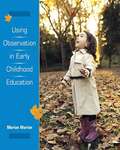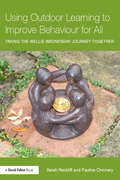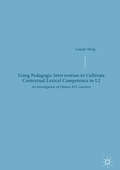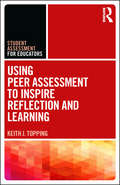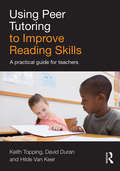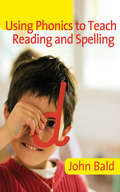- Table View
- List View
Using Literacy to Develop Thinking Skills with Children Aged 7-11
by Paula IleyThese creative off-the-shelf activities will spark children's thinking skills through speaking, listening, reading and writing. Busy teachers wanting to shake up their lessons will find them indispensable. Includes: problem-solving: creative and critical thinking; emotional thinking; questioning skills and plan-do-review formats clear explanation of underpinning theory advice on differentiating activities links to the National Literacy Strategy Framework.
Using Literature to Learn and Teach Language: The L3 Approach
by Carol GriffithsThis accessibly-written textbook uses the intrinsic appeal of a story to engage students with language, and provides teachers with the background knowledge and the skills to use literature to construct lessons for their classes which integrate all four skills plus language awareness in an enjoyable way. Although a number of books and studies have examined the value of using literature to learn language, literature remains under-represented as a language learning resource. The author argues that the accumulated body of literature represents a bottomless pit of potential material, just waiting to be recognised and enjoyed. From a teacher’s point of view, a lesson based on a literary work can provide an integrated approach to language development which few other approaches can match. A piece of literature can be used to develop all four skills, both receptive and productive (reading, writing, listening speaking) as well as production skills and language awareness. This book willbe an essential resource for pre-service and in-service teachers, teacher trainers, students and scholars of Applied Linguistics, Language Education, TESOL and related subjects.
Using Mathematics to Understand the World: How Culture Promotes Children's Mathematics
by Peter Bryant Terezinha NunesUsing Mathematics to Understand the World: How Culture Promotes Children's Mathematics offers fundamental insight into how mathematics permeates our lives as a way of representing and thinking about the world. Internationally renowned experts Terezinha Nunes and Peter Bryant examine research into children’s mathematical development to show why it is important to distinguish between quantities, relations and numbers. Using Mathematics to Understand the World presents a theory about the development of children’s quantitative reasoning and reveals why and how teaching about quantitative reasoning can be used to improve children’s mathematical attainment in school. It describes how learning about the analytical meaning of numbers is established as part of mathematics at school but quantitative reasoning is emphasized less even though it is increasingly acclaimed as essential for thinking mathematically and for using mathematics to understand the world. This essential text is for all students of mathematics education, developmental psychology and cognitive psychology. By including activities for parents and professionals to try themselves, it may help you to recognize your own quantitative reasoning.
Using Mentor Texts to Teach 6 + 1 Writing Traits: Mini Lessons for K-8 Teachers
by Beverly A. DeVriesIn this book, you’ll find a wealth of mini lessons designed to improve the quality of students’ writing. Each lesson uses a key mentor text and spotlights one of the 6 + 1 Writing Traits to allow students to focus on the essential aspects of good writing – content, organization, word choice, voice, sentence fluency, conventions, and presentation. Inviting and practical, the lessons are concise and follow a consistent model for easy implementation. With seven lessons per chapter, each includes step-by-step guidance, open-ended prompts, and suggestions for additional suitable mentor texts. The chapters are organized by genre – including fiction, informational texts, and poetry – and feature graphic novels and graphic informational mentor texts to inspire and engage students. Aligned with the Common Core State Standards, this resource is essential for any K-8 or pre-service teacher who wants to instill in their students the skills to become independent, confident writers.
Using Mindfulness to Improve Learning: 40 Meditation Exercises for School and Home
by Billie KrstovicWritten by an experienced school and meditation teacher, this book is packed with tried and tested mindfulness exercises and relevant follow-up wellbeing, pastoral and academic activities for anyone working with young people. It includes discussions about education and wellbeing, anecdotes from real life experience and numerous testimonies from students and teachers, as well as easy to follow instructions and plenty of useful in-depth explanations. All activities in this book link to variety of school subjects, including science, maths, philosophy, music, art and sport. Divided into two parts, the book explores: What mindfulness and grounding are How mindfulness and grounding works at home, in daily life and in education How teachers can use mindfulness and grounding in the classroom and how parents can support mindfulness and grounding at home What effects can be expected from mindfulness meditation This book is an invaluable resource for secondary teachers, youth workers, therapists and parents and can be used in classrooms, pastoral offices, youth clubs or at home.
Using Mixed Methods Research Synthesis for Literature Reviews: The Mixed Methods Research Synthesis Approach (Mixed Methods Research Series #4)
by Karin Hannes Mieke Heyvaert Patrick OnghenaUsing Mixed Methods Research Synthesis for Literature Reviews by Mieke Heyvaert, Karin Hannes, and Patrick Onghena is a practical guide that provides step-by-step instruction for conducting a mixed methods research synthesis (MMRS) that integrates both qualitative and quantitative evidence. The book progresses through a systematic, comprehensive approach to conducting an MMRS literature review to analyze and summarize the empirical evidence regarding a particular review question. Readers will benefit from discussion of the potential advantages of MMRS and guidance on how to avoid its potential pitfalls. Using Mixed Methods Research Synthesis for Literature Reviews is Volume 4 in the SAGE Mixed Methods Research Series.
Using Mixed Methods Research Synthesis for Literature Reviews: The Mixed Methods Research Synthesis Approach (Mixed Methods Research Series #4)
by Karin Hannes Mieke Heyvaert Patrick OnghenaUsing Mixed Methods Research Synthesis for Literature Reviews by Mieke Heyvaert, Karin Hannes, and Patrick Onghena is a practical guide that provides step-by-step instruction for conducting a mixed methods research synthesis (MMRS) that integrates both qualitative and quantitative evidence. The book progresses through a systematic, comprehensive approach to conducting an MMRS literature review to analyze and summarize the empirical evidence regarding a particular review question. Readers will benefit from discussion of the potential advantages of MMRS and guidance on how to avoid its potential pitfalls. Using Mixed Methods Research Synthesis for Literature Reviews is Volume 4 in the SAGE Mixed Methods Research Series.
Using Mobile Technologies in the Teaching and Learning of Mathematics (Mathematics Education in the Digital Era #12)
by Nathalie Sinclair Nigel Calder Kevin LarkinMobile technologies influence the way that we interact with the world, the way that we live. We use them for communication, entertainment, information and research. In education settings, there has been substantial investment in mobile devices, often without a concomitant investment in developing pedagogy and practices. With mobile technologies evolving rapidly, and the number of educational apps growing, there is a need for research into how they facilitate mathematics learning. Such research is of particular importance regarding how such devices may be used to open up new ways of envisaging mathematics and mathematics education, and to help develop conceptual rather than procedural or declarative knowledge. This volume draws upon international research and reports on a range of research projects that have incorporated mobile technologies for mathematics education. It presents research on the use of mobile technologies, such as iPads, iPods, iPhones, Androids, and Tablets, across a diverse range of cultures, year levels and contexts. It examines the ways in which mobile technologies, including apps, might influence students’ engagement, cognition, collaboration and attitudes, through the reshaping of the learning experience. In addition, the book presents appropriate ways to integrate mobile technologies into teaching and learning programmes. It is a significant reference book for those involved with teaching mathematics or using mobile technologies in education, while also offering insights and examples that are applicable to the use of digital technologies in education generally.
Using Moodle, 2nd Edition
by Jason Cole Helen FosterUsing Moodle is a complete, hands-on guide for instructors learning how to use Moodle, the popular course management system (CMS) that enables remote web-based learning and supplements traditional classroom learning. Updated for the latest version, this new edition explains exactly how Moodle works by offering plenty of examples, screenshots and best practices for its many features and plug-in modules. Moodle gives teachers and trainers a powerful set of web-based tools for a flexible array of activities, including assignments, forums, journals, quizzes, surveys, chat rooms, and workshops. This book is not just a how-to manual. Every chapter includes suggestions and case studies for using Moodle effectively. By itself, Moodle won't make your course better. Only by applying effective educational practices can you truly leverage its power. With this book, you will: Get a complete overview CMS in general and Moodle in particular. Review Moodle's basic interface and learn to start a course. Learn to add Moodle tools to your course, and how different tools allow you to give quizzes and assignments, write journals, create pathed lessons, collaboratively develop documents, and record student grades. Discover some of the creative ways teachers have used Moodle. There are plenty of ideas for effectively using each tool. Effectively manage your Moodle course, such as adding and removing users, and creating user groups. Learn to use Moodle's built-in survey functions for assessing your class. Find out how to administer an entire Moodle site. A system administrator usually handles these functions, but if you're on your own, there's a lot of power behind the curtain. Using Moodle is both a guide and a reference manual for this incredibly powerful and flexible CMS. Authored by the Moodle community, this authoritative book also exposes little known but powerful hacks for more technically savvy users, and includes coverage of blogs, RSS, databases, and more. For anyone who is using, or thinking of using, this CMS, Using Moodle is required reading.
Using Moodle: Teaching with the Popular Open Source Course Management System
by Jason Cole Helen FosterUsing Moodle is a complete, hands-on guide for instructors learning how to use Moodle, the popular course management system (CMS) that enables remote web-based learning and supplements traditional classroom learning. Updated for the latest version, this new edition explains exactly how Moodle works by offering plenty of examples, screenshots and best practices for its many features and plug-in modules.Moodle gives teachers and trainers a powerful set of web-based tools for a flexible array of activities, including assignments, forums, journals, quizzes, surveys, chat rooms, and workshops. This book is not just a how-to manual. Every chapter includes suggestions and case studies for using Moodle effectively. By itself, Moodle won't make your course better. Only by applying effective educational practices can you truly leverage its power. With this book, you will:Get a complete overview CMS in general and Moodle in particular. Review Moodle's basic interface and learn to start a course.Learn to add Moodle tools to your course, and how different tools allow you to give quizzes and assignments, write journals, create pathed lessons, collaboratively develop documents, and record student grades.Discover some of the creative ways teachers have used Moodle. There are plenty of ideas for effectively using each tool.Effectively manage your Moodle course, such as adding and removing users, and creating user groups. Learn to use Moodle's built-in survey functions for assessing your class.Find out how to administer an entire Moodle site. A system administrator usually handles these functions, but if you're on your own, there's a lot of power behind the curtain.Using Moodle is both a guide and a reference manual for this incredibly powerful and flexible CMS. Authored by the Moodle community, this authoritative book also exposes little known but powerful hacks for more technically savvy users, and includes coverage of blogs, RSS, databases, and more. For anyone who is using, or thinking of using, this CMS, Using Moodle is required reading.
Using Multiliteracies and Multimodalities to Support Young Children's Learning
by Marie Charles Bill Boyle'This is a timely book that effectively challenges the current emphasis on a homogeneous approach to teaching, learning, and assessment in early literacy. It encourages us to engage with the real world complexity of young children's learning and offers a series of rich and detailed examples of this in practice.' - Sally Neaum,Teesside and Durham Universities, and Author of Beyond Early Reading Grounded in classroom practice, this practical book shows trainees and current teachers how to scaffold children's literacy using a creative and supportive approach. It offers teaching strategies for Multiliteracies (fiction, expository/instructions, poetry, recount) and Multimodalities (reading, writing, speaking, listening, performing, illustrating) and helps to develop a relationship between teacher and learner. Chapter topics include: socio-dramatic play collaboration guided group teaching strategies integration of genres. This clear and accessible book will be extremely valuable to students and practitioners on PGCE programmes, B.Eds, Masters, workshop and conference CPD, and advanced Teaching Assistant training. Marie Charles is a teacher, formative assessment researcher and consultant. Professor Bill Boyle was until recently Director of CFAS in the School of Education, University of Manchester. Both authors are regularly involved in school-based research across England and international teacher training programmes.
Using Multimodal Representations to Support Learning in the Science Classroom
by Brian Hand Mark Mcdermott Vaughan PrainThis book provides an international perspective of current work aimed at both clarifying the theoretical foundations for the use of multimodal representations as a part of effective science education pedagogy and the pragmatic application of research findings to actual classroom settings. Intended for a wide ranging audience from science education faculty members and researchers to classroom teachers, school administrators, and curriculum developers, the studies reported in this book can inform best practices in K - 12 classrooms of all science disciplines and provide models of how to improve science literacy for all students. Specific descriptions of classroom activities aimed at helping infuses the use of multimodal representations in classrooms are combined with discussion of the impact on student learning. Overarching findings from a synthesis of the various studies are presented to help assert appropriate pedagogical and instructional implications as well as to suggest further avenues of research.
Using Music to Enhance Student Learning: A Practical Guide for Elementary Classroom Teachers
by Jana Fallin Mollie Gregory TowerIntegrating musical activities in the elementary school classroom can assist in effectively teaching and engaging students in Language Arts, Science, Math, and Social Studies, while also boosting mental, emotional and social development. However, many elementary education majors fear they lack the needed musical skills to use music successfully. Future elementary school teachers need usable, practical musical strategies to easily infuse into their curriculum. Written for both current and future teachers with little or no previous experience in music, Using Music to Enhance Student Learning, 2nd Edition offers strategies that are not heavily dependent on musical skills. While many textbooks are devoted to teaching music theory skills, this textbook is dedicated to pedagogy – the actual teaching of music – particularly in those schools without a separate music class in their curriculum. The ultimate goal is for future teachers to provide their elementary school classes with engaging learning experiences. These learning experiences are clearly presented to enable children to acquire knowledge in all subject areas within a joyful, creative environment rich with music activities. New to the second edition are the animated listening maps, more audio tracks, a new guitar unit, expanded coverage in the recorder unit, a connection with visual art and music, expanded activities in American history and math, and updated research and statistics. SPECIAL FEATURES Animated "Listening Maps" help listeners focus on music selections through clear visual representations of sound. Group Activities reinforce the social aspects of music-making, as well as the benefits of collaborative teaching and learning. A thorough integration of music in the curriculum establishes that music is essential in a child’s development, and that the incorporation of music will enhance all other subjects/activities in the classroom. Learning Aids include "Tantalizing Tidbits of Research," which provide the justifications for why these activities are important, as well as "Teaching Tips," and "Thinking It Through" activities. The Using Music Package Streamed listening selections from the Baroque, Classical, Romantic, and Contemporary Periods Get America Singing…Again! Volume 1 (developed in association with the Music Educators National Conference, now NAFME, and other music organizations) with 43 songs that represent America’s varied music heritage of folk, traditional, and patriotic themes Appendices include a songbook with Hispanic folksongs, a recorder music songbook and a guitar unit Companion website hosts various teaching and learning resources
Using Music to Enhance Student Learning: A Practical Guide for Elementary Classroom Teachers
by Mollie Gregory Tower Jana R. FallinIntegrating musical activities in the elementary school classroom can assist in effectively teaching and engaging students in Language Arts, Science, Math, and Social Studies, while also boosting mental, emotional and social development. However, many elementary education majors fear they lack the needed musical skills to use music successfully. Future elementary school teachers need usable, practical musical strategies to easily infuse into their curriculum. Written for both current and future teachers with little or no previous experience in music, Using Music to Enhance Student Learning, Second Edition offers strategies that are not heavily dependent on musical skills. While many textbooks are devoted to teaching music theory skills, this textbook is dedicated to pedagogy – the actual teaching of music – particularly in those schools without a separate music class in their curriculum. The ultimate goal is for future teachers to provide their elementary school classes with engaging learning experiences. These learning experiences are clearly presented to enable children to acquire knowledge in all subject areas within a joyful, creative environment rich with music activities. New to the second edition are the animated listening maps, more audio tracks, a new guitar unit, expanded coverage in the recorder unit, a connection with visual art and music, expanded activities in American history and math, and updated research and statistics. SPECIAL FEATURES Animated "Listening Maps" help listeners focus on music selections through clear visual representations of sound. Group Activities reinforce the social aspects of music-making, as well as the benefits of collaborative teaching and learning. A thorough integration of music in the curriculum establishes that music is essential in a child’s development, and that the incorporation of music will enhance all other subjects/activities in the classroom. Learning Aids include "Tantalizing Tidbits of Research," which provide the justifications for why these activities are important, as well as "Teaching Tips," and "Thinking It Through" activities. The Using Music Package Streamed listening selections from the Baroque, Classical, Romantic, and Contemporary Periods Get America Singing… Again! Volume 1 (developed in association with the Music Educators National Conference, now NAFME, and other music organizations) with 43 songs that represent America’s varied music heritage of folk, traditional, and patriotic themes Appendices include a songbook with Hispanic folksongs, a recorder music songbook and a guitar unit Companion website hosts various teaching and learning resources ISBN 978-0-367-11067-3 Using Music, Second Edition set includes: ISBN 978-0-415-70936-1 Using Music, Second Edition textbook Get America Singing... Again! Volume 1 songbook ISBN 978-0-429-02487-0 Using Music, Second Edition eBook is the textbok only. The songbook is only available with the print textbook and is not sold separately.
Using Narrative Inquiry as a Research Method: An Introduction to Critical Event Narrative Analysis in Research, Teaching and Professional Practice
by Patricie Mertova Leonard WebsterUsing Narrative Inquiry as a Research Method is the ideal introduction to a growing field of study. A full and accessible guide that covers the theory and practical applications of this qualitative method, it provides researchers with a rich framework through which they can investigate the ways people experience the world depicted through their stories. Looking at how this method can effectively be applied in a range of contexts, it demonstrates the value and utility of employing narrative as a research tool in a range of teaching and learning settings. Connecting with the broader academic debate on the value of narrative as an alternative or addition to quantitative and other qualitative methods and updated to reflect changes in the field, this book explores how to use narrative inquiry and gives tested and applied examples; builds on theory to consider practical applications; explores the narrative cross-boundaries between research and practice; and presents a selection of case studies of research on quality in higher education, internationalisation and quality in cross-cultural contexts. Using Narrative Inquiry as a Research Method provides the ideal grounding for all students and researchers looking to learn more about narrative inquiry or use this method within their research.
Using Narrative Inquiry for Educational Research in the Asia Pacific (Routledge Research in Education)
by Sheila Trahar Wai Ming YuNarrative inquiry is being used more widely in the UK, the USA, Canada, Australia, New Zealand and Northern European countries to conduct research across a range of disciplines. It is gaining popularity in Hong Kong, Macao and Mainland China, but research in these contexts continues to be dominated by quantitative and more traditional qualitative approaches. Narrative inquirers in these areas can, therefore, find it problematic to have the value of their work acknowledged. This book demonstrates creatively, accessibly and rigorously the ways in which narrative inquiry as a methodological approach, already more firmly established in Australia and New Zealand, is gaining a foothold in other parts of the Asia Pacific region. Contributors to the book write about their use of narrative inquiry in, for example, the Confucian heritage cultures (CHC) of Hong Kong, Mainland China, Singapore, Macao and the Anglo-Celtic cultures of Australia and New Zealand. Chapters in the book include: Creative Non-Fiction Across Cultures in Asia Pacific Contexts Riding the Wave of Education Reform: Using a Reflecting Team to Explore the Professional Identities of School Counsellors in Hong Kong Is the Silent Mode On? Re-searching Teachers' Voices in Macao through Narrative Research Narrative Inquiry and the Exploration of Culture for Improving Teacher Education This book will appeal to researchers across all sectors of education, in particular those who are exploring, the use of qualitative research methods in their context. Those interested in comparative education and cross-cultural studies will also find this book valuable.
Using National Data Bases in Educational Research
by Thomas L. HiltonThis book's purpose is to enable educational researchers to make better use of the huge longitudinal and cross-sectional data files that are now readily available. Of value to experienced researchers and undergraduates alike, the book focuses primarily on the planning and design of research rather than implementation of data base information. Its chapters address a variety of vital questions including: * What variables are present in each of the major national data bases? * What are the problems and dangers in making comparisons across data bases? * What factors invalidate comparisons of test scores across data bases? * In what ways can data from certain data bases be physically merged with data from other data bases? This text clearly demonstrates what can be done with large national data bases and, perhaps equally important, what cannot be done -- or done only if certain precautions are taken.
Using New Technologies to Enhance Teaching and Learning in History
by Terry HaydnNearly all history teachers are interested in how new technology might be used to improve teaching and learning in history. However, not all history departments have had the time, expertise and guidance which would enable them to fully explore the wide range of ways in which ICT might help them to teach their subject more effectively. This much-needed collection offers practical guidance and examples of the ways in which new technology can enhance pupil engagement in the subject, impact on knowledge retention, get pupils learning outside the history classroom, and help them to work collaboratively using a range of Web 2.0 applications. The chapters, written by experienced practitioners and experts in the field of history education and ICT, explore topics such as: how to design web interactivities for your pupils what can you accomplish with a wiki how to get going in digital video editing what to do with the VLE? making best use of the interactive whiteboard designing effective pupil webquests digital storytelling in history making full use of major history websites using social media. Using New Technologies to Enhance Teaching and Learning in History is essential reading for all trainee, newly qualified and experienced teachers of history. It addresses many of the problems, barriers and dangers which new technology can pose, but it also clearly explains and exemplifies the wide range of ways in which ICT can be used to radically improve the quality of pupils’ experience of learning history.
Using New Web Tools in the Primary Classroom: A practical guide for enhancing teaching and learning
by David Barber Linda CooperHow can we ensure we use technology effectively with young children? Using New Web Tools in the Primary Classroom is for all teachers interested in the application of new web-based ICTs to primary teaching. It offers a justification for using Web 2.0 tools and explores tangible ways in which technologies such as blogs, wikis, podcasting, media shar
Using Observation In Early Childhood Education
by Marian MarionWritten by a prolific, well-respected author, this book teaches how to observe, document, and assess children's development and progress—emphasizing how powerful ethical, responsible observation can be in a teacher's professional life. Focusing on observations as an intrinsic part of authentic assessment, the author advocates a protective, respectful attitude toward it. Provides an overview of various informal and formal observation and assessment strategies, as well as instruction in how to embed observation into the daily routine of the early childhood classroom. Explores ways to prevent problems, ways to solve problems, and ways to work cooperatively with parents. Included is coverage of the ethics of observation and the pros and cons of standardized testing as it relates to observation and assessment. For early childhood teachers.
Using Outdoor Learning to Improve Behaviour for All: Taking the Wellie Wednesday journey together
by Sarah Rockliff Pauline ChinneryUsing Outdoor Learning to Improve Behaviour for All focuses on teachers, parents and carers working together and creating environments in the classroom, home and particularly outdoors where all children can experience positive feedback and develop good learning behaviours. It tells the story of the Wellie Wednesday project and the journeys children took with their families and schools to achieve success. Based on attachment theory and research in psychology and neuroscience, this practical book will support practitioners, parents, carers and children, who find themselves in negative cycles and situations, to take steps forward to a positive future. Focusing on real situations and the needs of individual children and their families, this accessible guide is divided into four sections: Making a difference: for individual children, their parents, carers and schools. Can I be included? Case studies, including impact on family and school, strategies used, changes noticed and key questions raised. Addressing concerns: understanding behaviour as communication. How change happened: enriching learning to improve behaviour. Offering a wide collection of case studies and practical strategies, Using Outdoor Learning to Improve Behaviour for All will be an essential resource for all teachers, parents and carers wanting to support and guide children towards accessing education successfully.
Using Pedagogic Intervention to Cultivate Contextual Lexical Competence in L2: An Investigation of Chinese EFL Learners
by Gaiyan WangThis book challenges prevailing linguistic presumptions concerning contextual lexical meaning by examining whether pedagogic intervention targeted at raising Chinese EFL learners’ awareness of the pragmatic nature of contextual lexical meaning can enhance the learners’ contextual lexical inferencing competence (CLIC). CLIC is crucial to the development of a learners’ vocabulary, reading ability and autonomy in reading. Through an empirical study conducted among a group of adult Chinese students of English, the author shows that the power of CLIC instruction lies mainly in its effectiveness in enhancing learners’ self-confidence in making lexical inferences. This book will be of interest to researchers and students of applied linguistics, TESOL, language education, and for language professionals keen to extend their research experience.
Using Peer Assessment to Inspire Reflection and Learning (Student Assessment for Educators)
by Keith ToppingThere is increasingly strong evidence that K-12 learners who assess each other’s work and then engage in related reflections, discussions, and negotiations benefit mutually from the process. In this practical volume, Keith J. Topping provides suggestions for implementing effective peer assessment across many classroom contexts and subjects. Using Peer Assessment to Inspire Reflection and Learning offers pre- and in-service teachers a variety of teaching strategies to best fit their particular students and school environments along with straightforward tools to evaluate peer assessment’s impact on their classrooms.
Using Peer Tutoring to Improve Reading Skills: A practical guide for teachers
by Keith Topping David Duran Hilde Van KeerUsing Peer Tutoring to Improve Reading Skills is a very practical guide, offering a straightforward framework and easy-to-implement strategies to help teachers help pupils progress in reading. A succinct introduction, it shows how schools can make positive use of differences between pupils and turn them into effective learning opportunities. Outlining the evidence base supporting peer tutoring approaches, it explores the components of the reading process and explains how peer tutoring in reading can be used with any method of teaching reading. Core topics covered include: Planning and implementing peer tutoring Getting your school on board How to structure effective interaction Training peer tutors and tutees Paired Reading - cross-ability approaces One Book for Two - fostering fluency, reading comprehension, and motivation Reading in Pairs - cross and same-year tutoring Supporting struggling readers Involving families in peer tutoring Evaluation and feedback. Illustrated throughout with practical examples from diverse schools across Europe, Using Peer Tutoring to Improve Reading Skills is an essential introduction offering easy-to-use guidelines that will support teachers in primary and secondary schools as they enhance pupil motivation and improve reading standards.
Using Phonics to Teach Reading & Spelling
by John BaldIncludes CD-Rom Times Educational Supplement Star Read! 'This is an authoritative yet lively and eminently readable book. It is well grounded in both the latest academic theory and experienced hands-on pedagogic practice, and it summarises succinctly the implications of the recent Rose Report, giving a masterly exposition of both synthetic and analytic phonics and their places in the processes of learning to read and spell. Practical and organisational issues are tackled in a most supportive way, with very useful checklists and photocopiable proformas on an accompanying CD. The book also provides and excellent guide to provision for professional development, involving the use of lesson observation and part of the evaluation and planning cycle for CPD. Its style is clear and well signposted with subheadings, case-study boxes to illuminate points, and with aims given at the start of each chapter as well as challenging points for reflection and guides to further reading at the ends. Every staff room should have one!' - Dorothy Latham, Primary Education Consultant, English specialist and author of How Children Learn to Write 'Synthetic phonics may well be only one tool for teaching reading and spelling, but it is the single most important one' - Ruth Kelly, Education Secretary, March 2006 'Teachers - and particularly Literacy Co-ordinators or SENCOs - who are enthusiastic about children's learning and about their own professional development will undoubtedly benefit from using this book and CD, with its combination of useful explanation and practical resources to support the implementation of the ideas' - Lorna Gardiner, General Adviser, Foundation Stage, North Eastern Education and Library Board, Northern Ireland Are you looking for practical advice on how to teach phonics? By giving the reader a basic introduction to teaching reading and spelling using phonics, this book will provide you with easy-to-use ideas for your classrooms. Following on from the recommendations of the Rose Report, the author explains why teaching phonics works, and how to present irregular as well as straightforward features of English. The book: o contains practical examples and activities for teachers o explains the basis of synthetic and analytic phonics o gives advice on choosing the best resources o looks at how to help the weakest readers o includes a CD Rom with photocopiable resources and INSET materials o contains a glossary of key terms Literacy Co-ordinators, teachers and teaching assistants will find this an invaluable resource.
